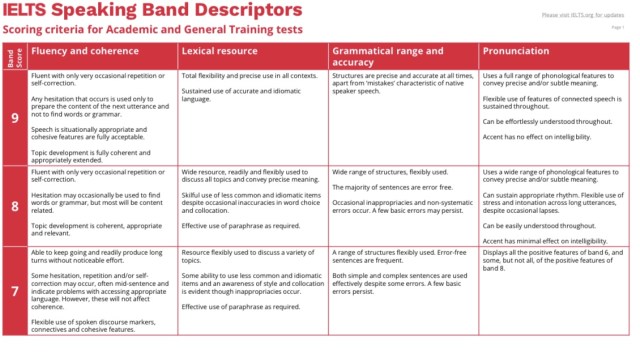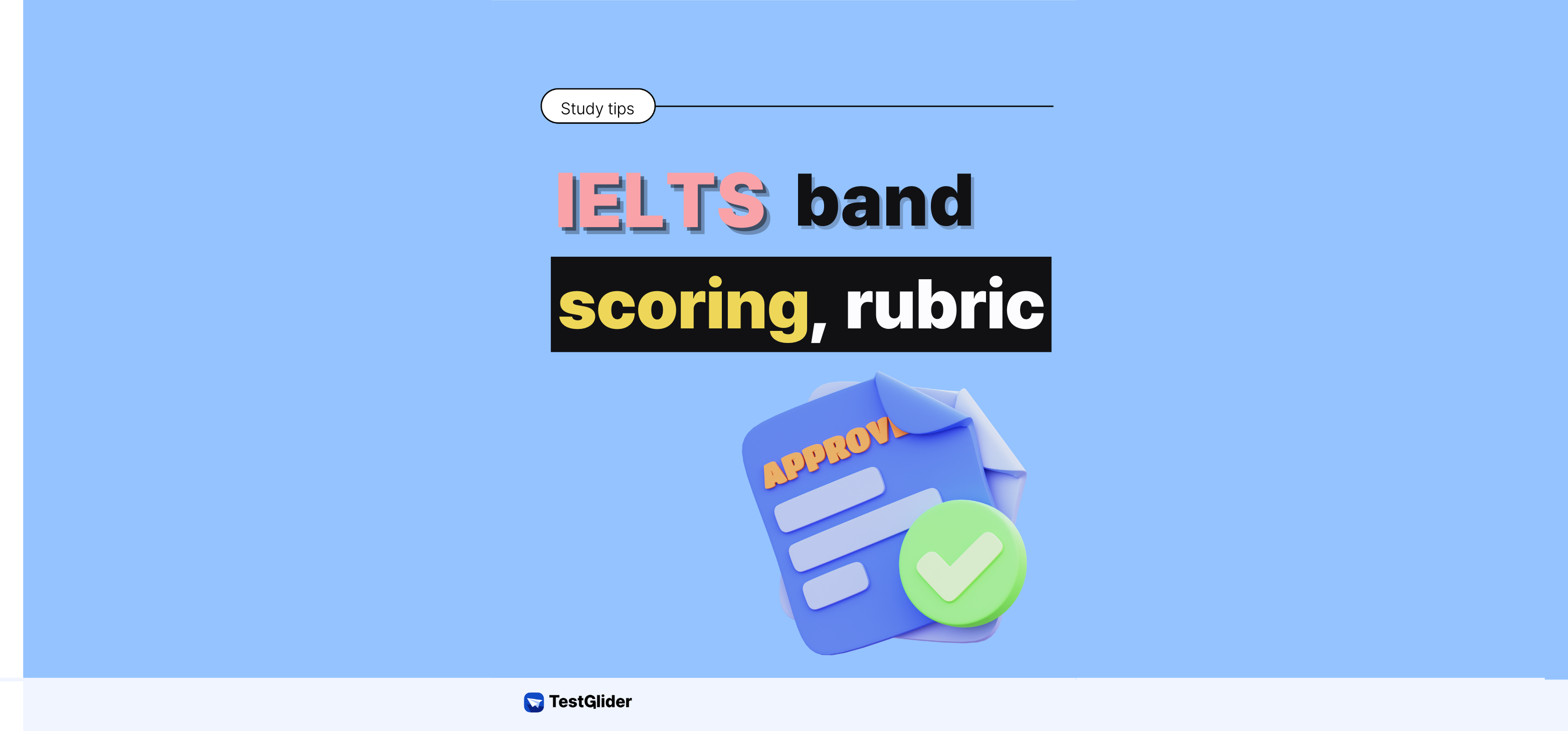Are you looking to know how IELTS scores are evaluated?
Hello, this is TestGlider, the world’s leading AI English test tutor, trusted by 720,000 users globally. Many individuals preparing for the IELTS exam have specific target IELTS scores in mind. How are the band scores derived from the individual scores in the Listening, Reading, Writing, and Speaking sections? Additionally, what are the criteria for scoring each section? Let’s explore how IELTS scores are assessed and the scoring criteria for each section with TestGlider!
Complete Guide for IELTS Scoring
1) Concept explanation
a) IELTS Raw Scores
The IELTS exam is divided into four sections—Listening, Reading, Writing, and Speaking. The scoring method differs slightly between sections. Let’s look at how raw scores are derived in each section:
1) Listening
In the Listening section, you will listen to 4 audio clips and answer 40 questions.
You receive 1 point for each correct answer. As a result, the maximum score is 40.
2) Reading
In the Reading section, you will read 3 passages and answer 40 questions. The questions may involve selecting true, false, not given, complete sentences, etc.
Additionally, similar to the Listening section, you receive approximately 1 point per correct answer, with a maximum score of 40.
3) Writing and Speaking
For the Writing and Speaking sections, ‘band’ scores are determined based on specific criteria designed for each section, rather than a raw score.
Then, what’s the IELTS band score?
b) IELTS Band Scores
The band scores for Reading and Listening sections are determined based on your raw score. On the other hand, for Writing and Speaking, raw scores are band scores themselves.

The band score calculation for the Reading section varies depending on the type of IELTS tests. For those curious about the different types of IELTS test, follow the link below for more information!
Here are the band score classifications for Academic and General Training Reading:
Academic Reading:
- Band 5 = 15 or more out of 40
- Band 6 = 23 or more out of 40
- Band 7 = 30 or more out of 40
- Band 8 = 35 or more out of 40
General Training Reading:
- Band 4 = 15 or more out of 40
- Band 5 = 23 or more out of 40
- Band 6 = 30 or more out of 40
- Band 7 = 34 or more out of 40
- Band 8 = 38 or more out of 40
The Listening band score classifications are as follows:
- Band 5 = 16 out of 40
- Band 6 = 23 out of 40
- Band 7 = 30 out of 40
- Band 8 = 35 out of 40
After receiving band scores for each section, you will also receive an overall band score, which you will typically submit to institutions.
What exactly is the overall band score?
c) IELTS Overall Score
The overall score is the average of the band scores from the four sections, rounded to the nearest 0.5.
The overall band score is rounded up to 0.5 if the average of the four sections ends at 0.25. If it ends in 0.75, it is rounded up to 1.
If the average ends in 0.24 or below, or 0.74 or above, the overall score is rounded down to the nearest 0 or 0.5.

2) Scoring rubric
a) Writing Scoring rubric
The Writing section is evaluated based on ‘Task Achievement,’ ‘Coherence and Cohesion,’ ‘Grammatical Range and Accuracy,’ and ‘Lexical Resource.’ Not to mention, the band score for the Writing section is determined by considering each of these rubrics. Let’s explore each rubric in detail:
– Task Achievement assesses how well the topic is understood and addressed. Furthermore, it evaluates whether the discussion is in-depth and whether you support the ideas with appropriate evidence and examples.
– Coherence and Cohesion check whether the essay has a clear structure and logical flow. For example, it looks at how well the paragraphs are connected and whether the essay maintains a consistent topic with smooth transitions between sentences and paragraphs.
– Grammatical Range and Accuracy evaluates the use of various grammatical structures and the accuracy of sentence construction. It assesses how few grammatical errors there are and whether these errors significantly impede communication.
– Lexical Resource examines the appropriateness and variety of vocabulary used to convey meaning. It considers the accuracy, diversity, and appropriateness of word choice and whether the expressions and vocabulary used are suitable for the context.

For more detailed information on the band-specific Writing scoring criteria, please refer to the link below!
[IDP Writing Detailed Scoring Criteria PDF]
b) Speaking Scoring rubric
The Speaking section measures conversational ability, which is assessed based on ‘Fluency and Coherence,’ ‘Lexical Resource,’ ‘Pronunciation,’ and ‘Grammatical Range and Accuracy.’ The band score for the Speaking section is determined by evaluating each of these criteria. What do these criteria entail?
– Fluency measures how smoothly and promptly you respond without significant pauses or interruptions. It looks at whether you maintain a natural flow in conversation and speak at an appropriate pace.
– Coherence assesses whether you present your ideas and opinions clearly and logically structure and organize your explanations.
– ‘Vocabulary Variety’ involves using a range of appropriate and diverse vocabulary to convey precise meanings. ‘Vocabulary Appropriateness’ includes choosing accurate words for the context, avoiding repetition, and using suitable alternative expressions when needed.
– Pronunciation includes ‘Clarity’ and ‘Intonation and Stress.’ ‘Pronunciation Clarity’ ensures that your pronunciation is clear and easily understandable. ‘Intonation and Stress’ involves using appropriate intonation and stress to convey meaning effectively and naturally in conversation.
– Grammatical Range and Accuracy involve ‘Grammatical Range,’ which refers to using various grammatical structures to express complex ideas, and ‘Grammatical Accuracy,’ which involves minimizing errors that could impede communication.

For more detailed information on the band-specific Speaking scoring criteria, please refer to the link below!
[IDP Speaking Detailed Scoring Criteria PDF]
In summary, we have explored how IELTS scores, band scores, and overall band scores are calculated, as well as the scoring criteria for Writing and Speaking, we hope you have a clearer understanding.
For more information on IELTS scoring, we recommend visiting the official IDP website:
[Visit IDP website for Detailed Scoring Information]
If your goal is to achieve a band score of 6.5 or higher, consider reading the article below!
If you want to check IELTS Test Dates in 2024 from August to December, follow the link below.

